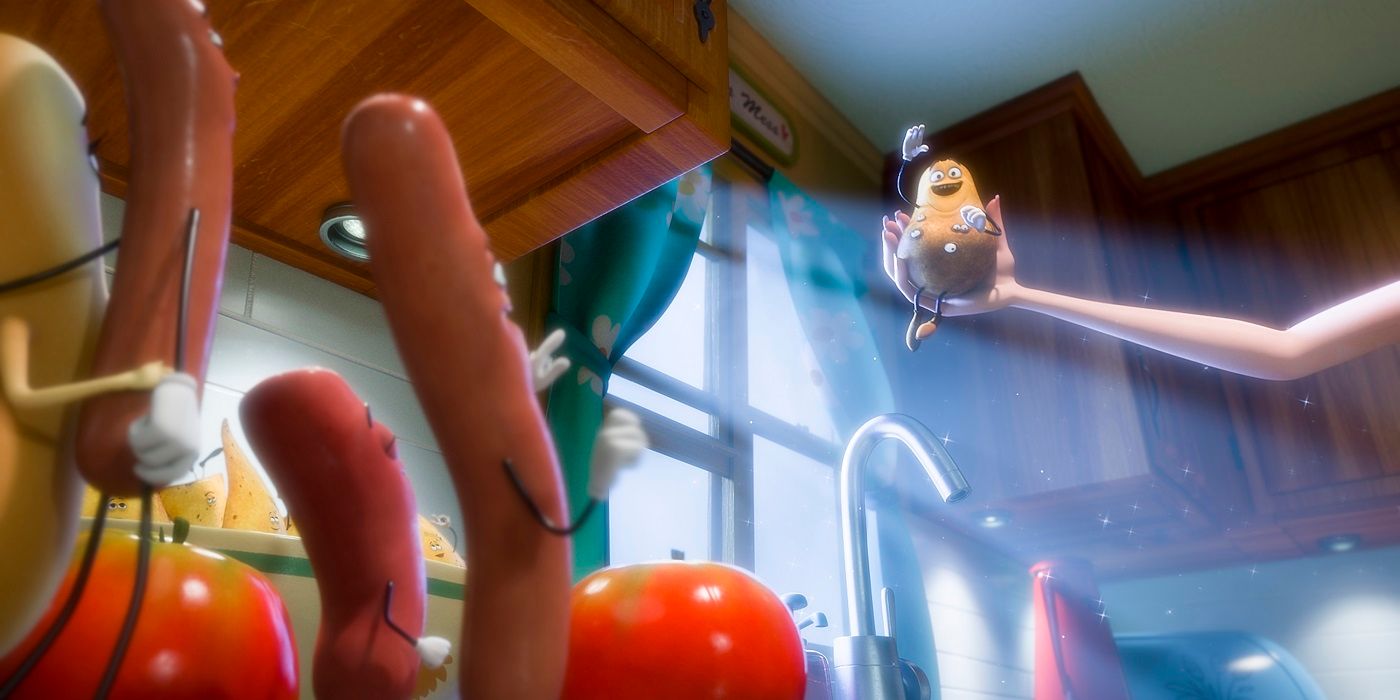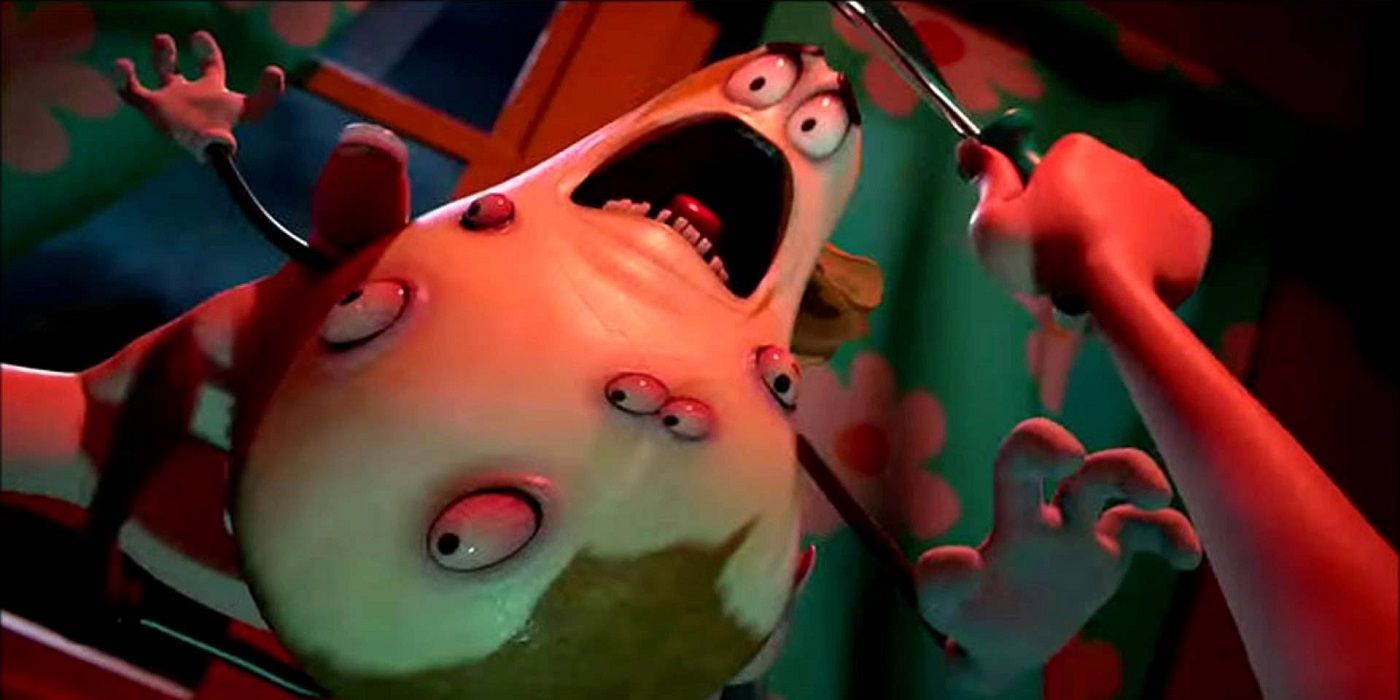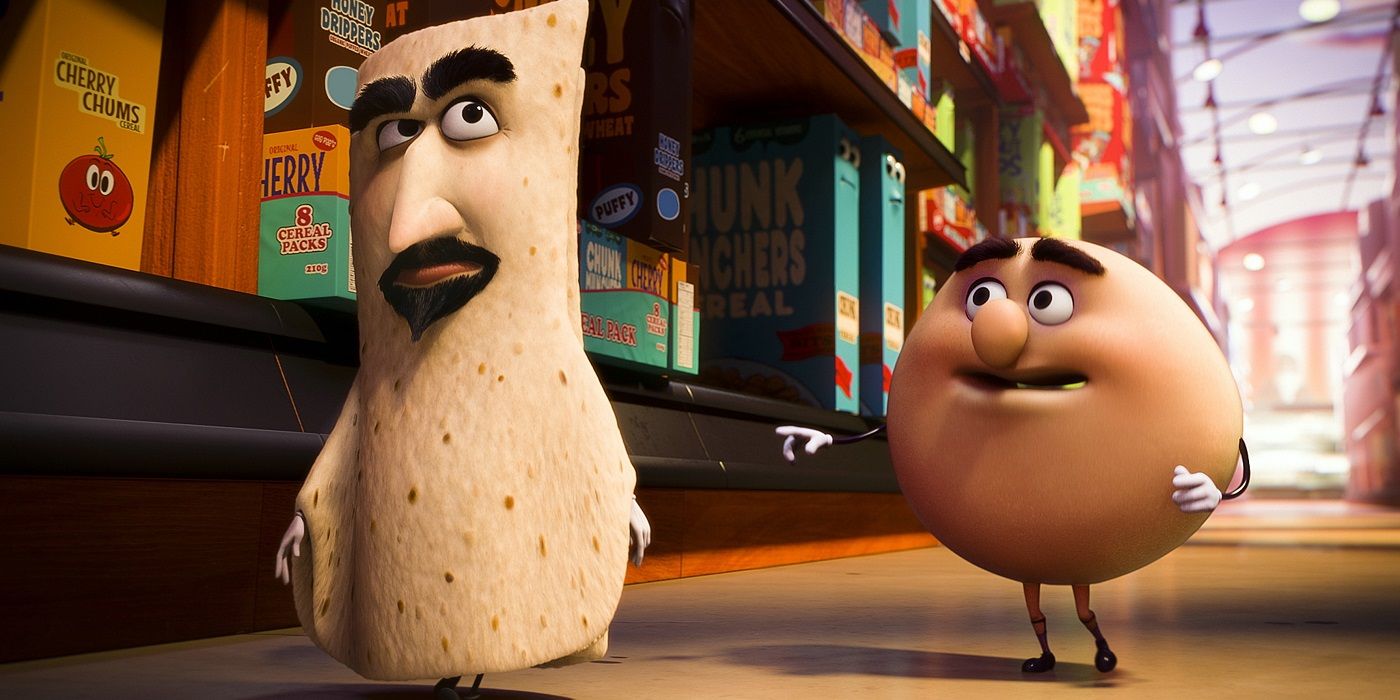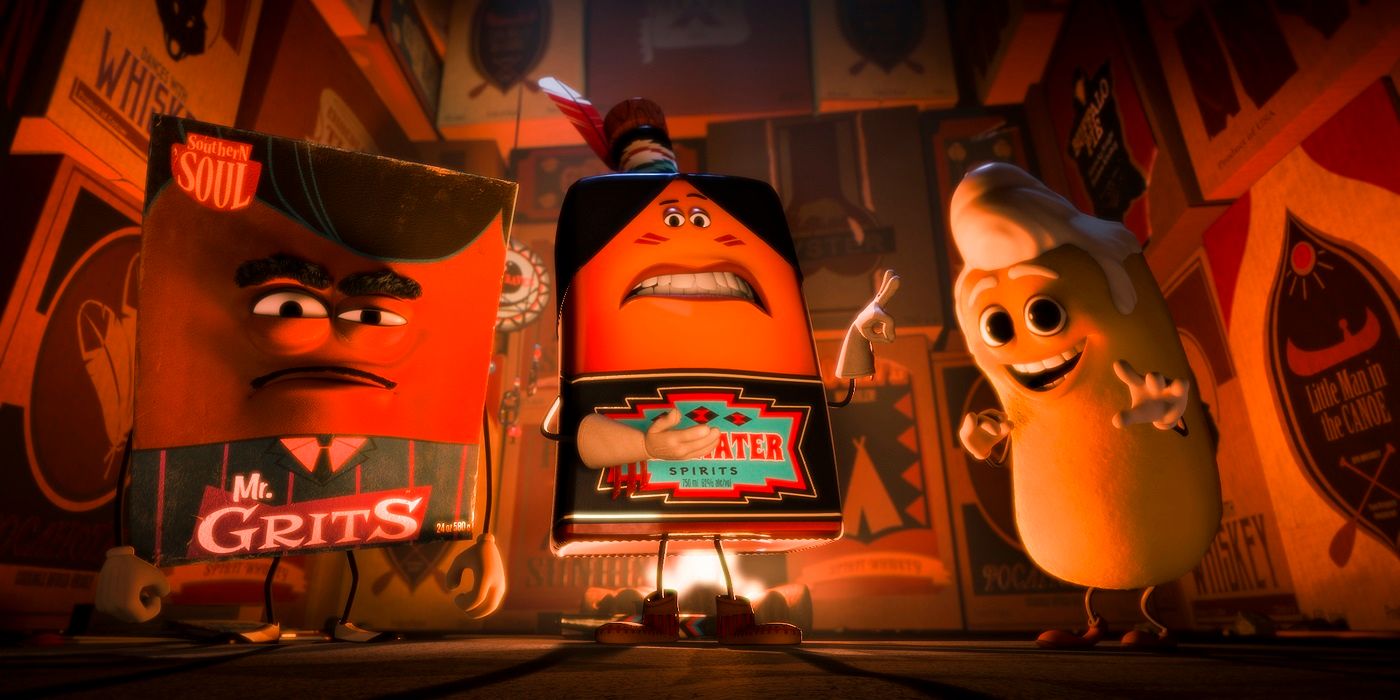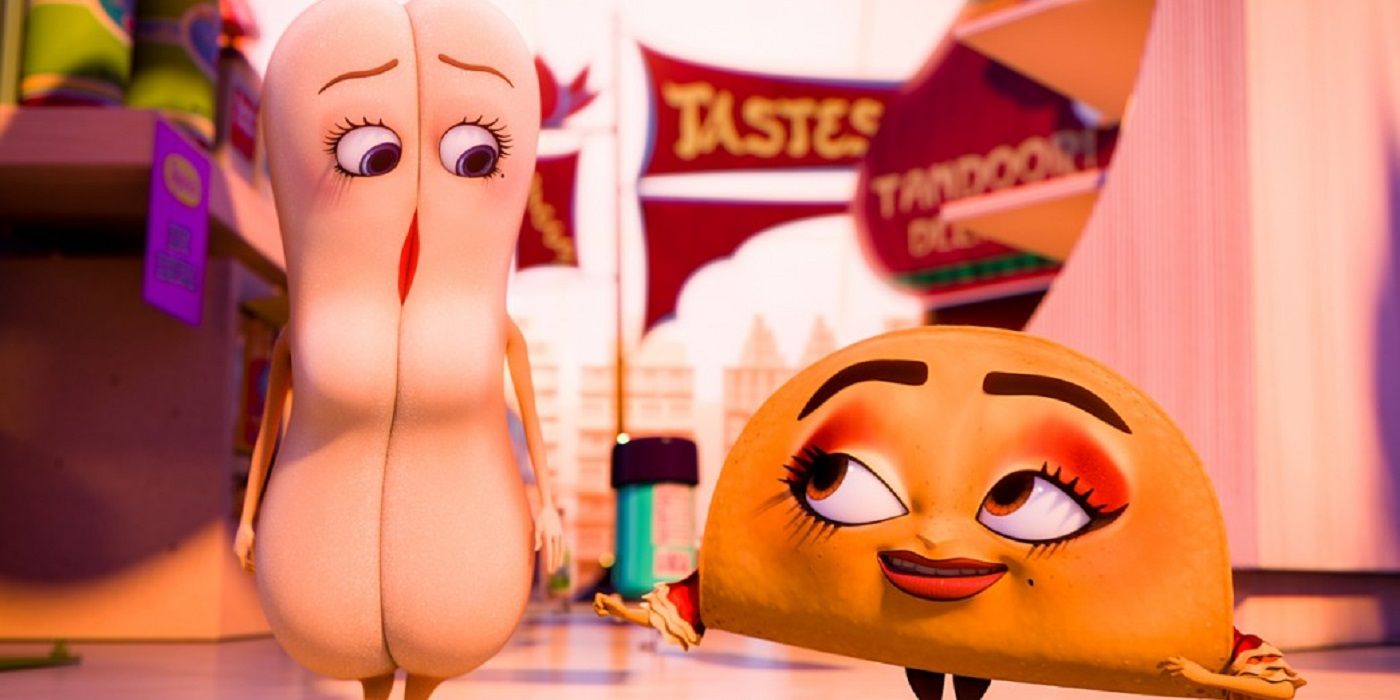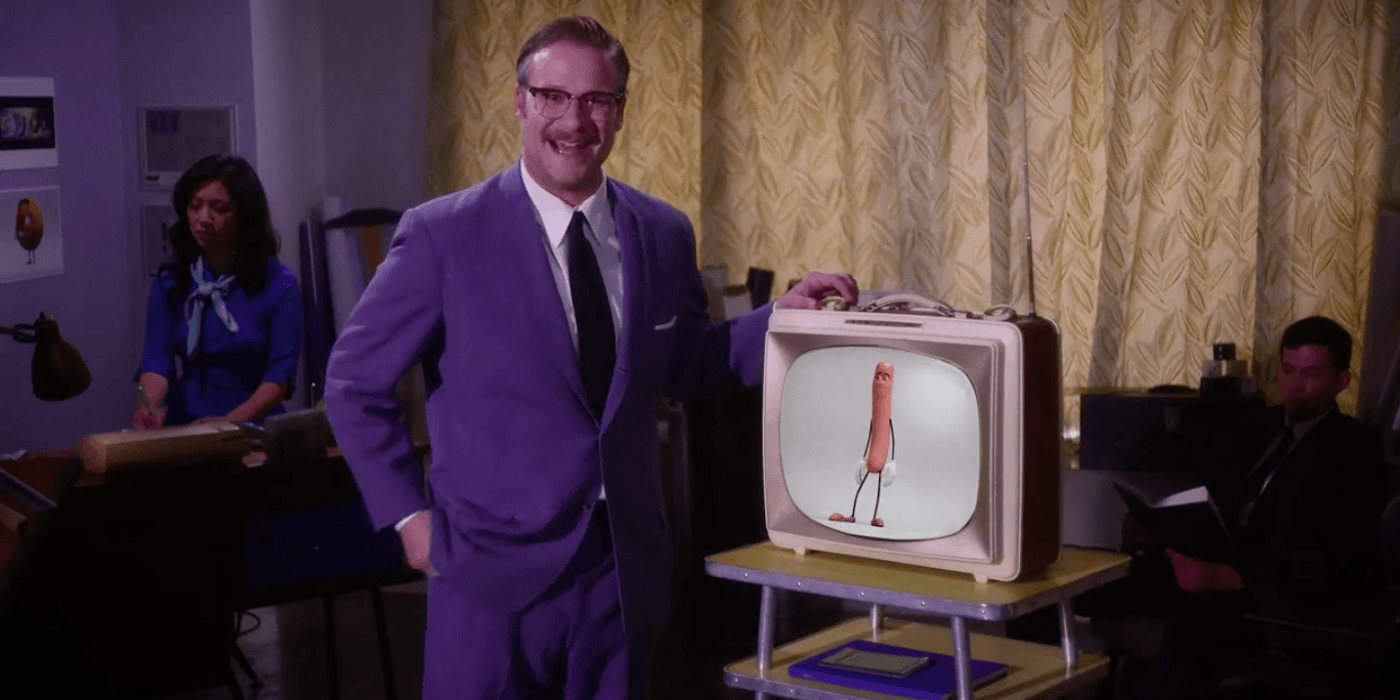Warning: SPOILERS ahead for Sausage Party
–
Just beneath the surface of profanity, racial stereotypes, and raunchy visual gags, Sausage Party is a shockingly nuanced existential metaphor. The anthropomorphized foodstuffs of Shopwell's Grocery Store live with a pseudo-puritanical belief system. They don't strip from their packages and they certainly don't push their sausage bodies into their girlfriends' buns. They live under the impression that the gods (shoppers) who casually cart them out the doors have "chosen them" due to appropriate behavior. Once chosen, they will go to The Great Beyond, a paradise past comprehension, where they'll finally have the opportunity to get freaky.
During the course of the film, hot dog and protagonist Frank (Seth Rogen) discovers that the store's belief system is an invention of the non-perishables. In reality, the "gods" are cruel and murderous devourers of food, and being chosen for The Great Beyond is a death sentence. The religion of Shopwell's truly is an opiate for the masses, designed to keep the peace for a secluded faction of immortal foods before an inevitable and horrific end to the rest.
Some have argued that Sausage Party has an atheistic viewpoint, that it illustrates that there is no god and that religion is a foolish distraction from the harsh realities of the universe. But this belies the text of the film. If anything, its truth is misotheistic, recognizing that higher powers exist, but identifying them as enemies to be feared and hated. Or it could be compared to Gnosticism, which teaches of a "demiurge" (or lesser god) that created our physical realm, while the greater god(s) dictate a more pure and meaningful spiritual realm.
But trying to peg the exact belief system Sausage Party supports is completely missing the point. The film's reality is an extension of its absurd premise, which itself was chosen because it offered humorous drama. While it certainly poses a twisted "What If" scenario concerning the truth of our creator(s), what it more succinctly points to is how to explore the mysteries of the universe.
Frank is an effective protagonist because he doesn't blindly accept the world as it is presented to him. He accepts the song of The Great Beyond (Shopwell's version of a holy text) as the prevailing theory of divine truth in his culture. He even tries to live his life by it. But unlike many others, he's willing to ask the all important "why". When a horrified Honey Mustard (Danny McBride) returns from The Great Beyond with a nihilistic outlook, Frank is the first to accept that things are not as they seem.
In fact, most of the others simply disregard Honey Mustard as crazy. This is an effect of confirmation bias - peoples' inherent tendency to interpret information in a way that confirms their preexisting beliefs, while paying less attention to alternate possibilities. Every human brain is full of shortcuts like these. The mind is a muscle; if its tendency were to deeply consider every possible worldview any time one was presented, we would live in a constant state of mental exhaustion.
So, these mental shortcuts are a long-held survival tactic, but using them all the time can have some decidedly negative results. This is why it's important to keep one's "questioning muscle" strong. Living entirely by confirmation bias is (initially) easier, but it's not healthy. There's a certain level of "If it ain't broke, don't fix it" that we have to live with in order to reasonably function in society, but it's also important to remain open to alternative worldviews. For instance, if a screaming jar of Honey Mustard has just been returned from The Great Beyond and he's telling you that every unknowable factor you believed in is a lie, it might be time to start engaging the critical thinking part of your brain.
That isn't to say that every challenge to one's worldview should be taken as fact; allowing the brain to question its view of reality is only the first and easiest step. The next is digging for answers. When Frank and his girlfriend Brenda (Kristen Wiig) survive an accident that thwarts their journey to The Great Beyond, Frank immediately begins looking for confirmation of Honey Mustard's claims.
Brenda is a true believer in the song of The Great Beyond, and is already getting a bit peeved at Frank's questioning of their shared belief system. He knows she's not going to be cool with his existential search. When they get lost, Frank lies to her so he can secretly redirect their adventure towards answers. His risk pays off. He finds the non-perishables and they share their dark secrets over a smoke. But the danger Frank puts his companions in, and his continued insistence on looking for answers afterwards, drives a divide between him and Brenda.
Frank had all the best intentions in figuring out the truth, but he lost the moral high ground when he lied to his girlfriend about it. Searching for answers is difficult and it's often not the most popular course of action. It requires courage, not just to make the journey but to take an honest stand. This can be especially tough when you don't have all the answers, but it's absolutely crucial to the next step.
Guided by the non-perishables, Frank finds a cookbook - pretty hard evidence that humans are the food-eating monsters he feared. He uses Shopwell's PA system to show it to every food item in the store. But in spite of the evidence, they shun his discovery, coming up with cheap excuses for why his evidence doesn't matter. Frank is angered by their unhelpful response. He just did all the hard work of searching for answers, but now has to live with the knowledge of their impending doom without a single soul to help him fight it.
Realistically, Frank should have known better. If they refused to listen to Honey Mustard, why would they listen to him? Sure, his evidence was better, but the simple fact was that the foods didn't want their beliefs challenged. If the gods were monsters, then their lives were hopeless. There was nothing to look forward to but despair.
Of course, Frank's open outlook is preferable to putting on protective blinders. But it also made him arrogant, unable to empathize with the others, much less respect where they're coming from. It's easy to posit "Well they don't deserve empathy or respect because they're wrong," but this attitude defeats any benefit to evangelizing the truth. Shutting out those without empathy is one of strongest mental shortcuts human beings have. Our inability to respect those we disagree with nearly guarantees we will never get through to them. Perhaps it's "unfair" to have to be the one searching for truth and be the bigger man, but that's the cost of positive change.
Frank realizes that he's been obtuse about his approach. If he's going to get the others to listen, he needs to approach them respectfully, but he also needs to have an alternative to hopelessness. The answer comes to him when his friend Barry (Michael Cera) suddenly returns from The Great Beyond with the head of a god, revealing that their persecutors can be killed! The foods of Shopwell's may survive... if they're willing to fight!
Granted, a dramatic battle with food items vs. humans is a lot more entertaining to watch than most changes to our worldviews. In reality, this typically affects our actions in small ways over our lives - how we treat others, how we vote, or how we spend our time and resources. It may feel trivial on a daily basis, but over time, it can make a dramatic difference to our lives and the lives we touch.
Having a clear and functional alternative to a worldview by no means guarantees people will flock to it, even if it is presented respectfully and with overwhelming evidence. Following the Sausage Party metaphor, one could easily imagine the Shopwell's employees having a cookout inside the store while devout grocery items nearby rationalize that this was a necessary exception to their beliefs: "The gods work in mysterious ways."
Sausage Party's action-packed climax is immediately followed by a celebratory food orgy that's as much a visual gag as a suggestion, but perhaps not in the most obvious way. While the text of the film is decidedly (humorously) anti-puritanical, the message is ultimately that we should live our lives to the fullest.
Gaining a better understanding of our place in the universe offers benefits to our survival. It also gives us context by which to live our lives, but few definitive answers. If we receive proof that God does/doesn't exist, does that change our moral responsibilities? If we receive proof that we are/aren't damaging the environment beyond repair, how will that change the way we vote? It's harder when new evidence puts a crack in the science, holy text, or moral code we used to consider "definitive." This doesn't necessarily mean it's time to throw the entire thing out the window, but it's certainly time to re-evaluate our dogmatic beliefs and behaviors.
For instance, if you happen to be a sexually-repressed, animated food item, this might mean trying out that orgy you've been putting off. If you're an actual human being, you may want to take it a bit slower - dip your toes in the water of adjusting your lifestyle first - but testing what world has to offer is one of the joys of being alive. Sausage Party takes a definitive stance of "If the gods are a lie, we'll follow the rules that suit us".
Sausage Party ends with yet another dramatic twist. Firewater (Bill Hader) and Gum (Scott Underwood) have discovered that none of them truly exist at all. They are make-believe characters, animated and acted out by individuals in a "real world" elsewhere. Frank dethroned one set of gods just to have another set appear. Whatever he finds through that Stargate-styled portal in the sequel is sure to rock his world just as much as Honey Mustard's revelation did in this one.
It's a fantastic analog to the realities of truth and belief. None of us will ever have all the answers. Doing so is impossible. You may discover a great truth, live your life by it, and share it respectfully for the betterment of others. But that doesn't mean you're done. Human existence is a never-ending cycle of searching for an answer, only to find it and reveal a thousand more questions. Reality is like watching Lost, but with a better excuse for being obtuse.
Despite the guaranteed lack of omnipotence, there's still a benefit to proceeding with an open mind and an adventurous spirit. Far from the anti-religious film many have pegged it as, Sausage Party is more interested in the search for truth. It's not a condemnation of religion, but of unchecked belief and of closing our minds to the possibilities that there are truths that could change how fully we live our lives.
Sausage Party is in theaters now.


